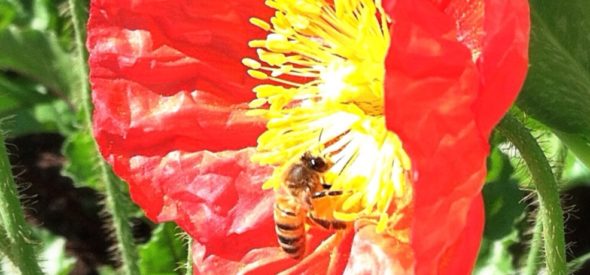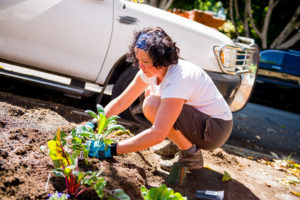The best companion flowers for organic vegetable growing
4September 19, 2012 by Hope Gardens

Planting flowers in the garden is very important. If you didn’t do it when you installed your garden, I will convince you why you should do it now. A bee needs to visit a flower 7-8 times to pollinate it so you need to do all you can to draw that pollinator to your vegetables time and time again. Flowers also have the ability to attract other beneficial insects and deflect those bugs who are less than beneficial. They create extra beauty in the garden as well which is always welcome.
ENCOURAGE YOUR KIDS TO UNDERSTAND THE IMPORTANCE OF BEES IN THE ECOSYSTEM.
My favorite flowers to plant in the veggie garden depending on the season are pansies, cosmos, sweet alyssum, marigolds, calendula, lobelia and icelandic or oriental poppies. Deadheading your flowers is imperative (cut off spent flower heads) to keep them going and then replace the entire plant when it fades.

I also adore borage. It is a cinch to grow from seed and re-seeds like crazy. It grows big, so give it lots of room…think the very end of your garden, and it might need staked. Borage is uber- compatible to vegetable plants, repels the tomato hornworm, is a bee magnet, and blooms with beautiful, blue, edible flowers; the essence of which brings courage. What’s not to love?
Here is a list of plants that perform a miracle in the organic garden: they attract bees and the kind of beneficial insects that actually eat bad insects and some can even be used as a natural fertilizer.
African Basil, Aloe, Bergamot, Butterfly weed, Caraway, Chamomile, Cilantro, Coreopsis, Cosmos, Dill, Echinacea, Fennel, Gloriosa daisy, Lavender, Lemon Balm, Lobelia, Marigold, Milkweed, Parsley, Penstemon, Pineapple Sage, Poppies, Queen Anne’s Lace, Scented Geranium, Spearmint, Statice, Stonecrop (Sedum), Sunflower, Sweet Alyssum, Valerian, Verbena, Yarrow, Zinnia.
This year I grew my marigolds from seed and I am thrilled at how much nicer they are than the ones I bought in six-packs at the store. Pro-tip: Zinnias get moldy when given fertilizer or rich soil. If you do get mildew on your leaves use an organic fungicide.
Category Landscaping, Vegetable gardening | Tags: bees, companion planting, compatible plants, flower, Garden, Home garden, organic, Plant, Vegetable



